Each Mandalas for Marinke posts provides information about depression. This one discusses the genetics of depression. Some depression is genetic. Some isn’t. The more we learn about the disorder, the more we can understand it. The more we understand it, the more we can decrease stigma around depression. If the genetics of depression are an area of interest for you, delve deeper into that and share what you learn. We can all grow our knowledge.
Crochet Mandala for Wink
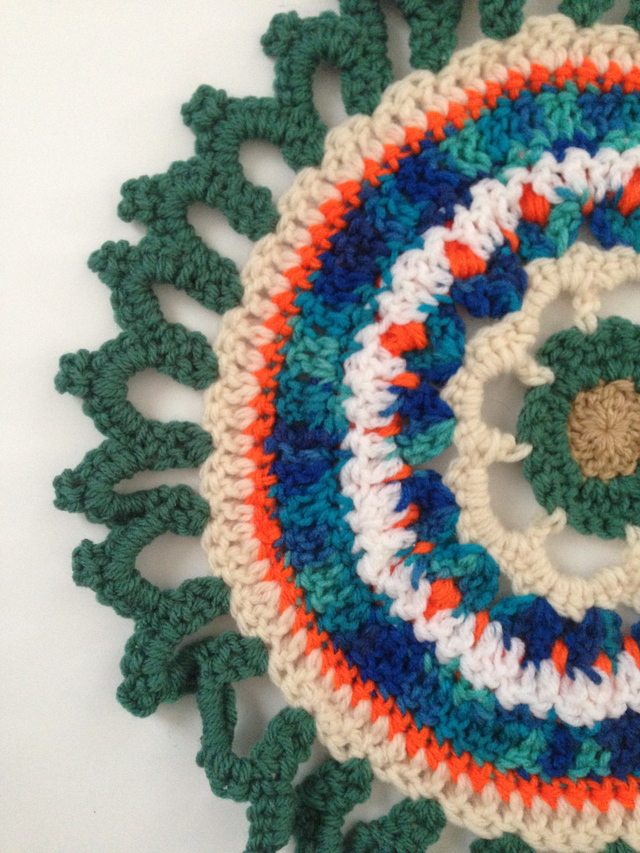
This colorful crochet mandala was made using the free crochet mandala tutorial that Wink posted in her Tuts+ column. I adore the creative combination of colors used here, with the bold orange and variegated blue softened in between rows of cream and green. It’s a unique piece and is going to be an amazing addition to the final display of all of the mandalas!
Meet the Maker of this Mandala
This special crochet contribution comes from Susan who lives on a farm in Western Kansas. She is joined there by her husband, biological daughter, and four foster children. The farm is also home to a dog, cats, chickens and horses. It sounds like a really special place. Although it’s totally cliche, I can’t help but think that “there’s no place like home” when I read about it.

All of these contributions seem to be coming in with the exact right timing. I was a foster mother myself for a couple of years and last night I dreamed about the child who I originally got into that work for. He didn’t end up becoming my foster child after all. However, he was a very special force in my life (and I hope I played a small part in his.)
Message from the Maker
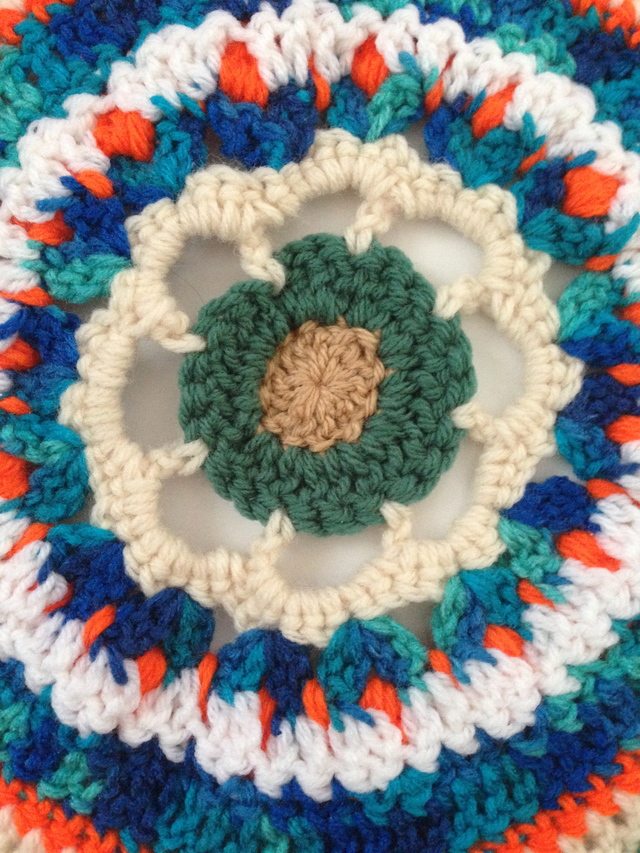
Each contributor to the Mandalas for Marinke project is encouraged to share their own story, a message to the family or thoughts about depression. Susan shared a beautiful letter to Marinke’s family. She writes:
“I read about your tragedy today and was driven to contribute. Her life can’t have passed without remembering her. I didn’t know her except for our common love of crochet and the Crochet Addict website. I’ve dealt with mild depression myself but have helped my children through some very difficult times and have been their advocate when the system failed them. I pray that Wink’s work will make a difference for someone in need. I’m SURE it will.”
She adds:
“This is my prayer mandala. A prayer for Wink’s family in each stitch.”
Note: Anyone interested in prayerful or meditative crochet can find information on mindfulness in my books Crochet Saved My Life and Hook to Heal.
Words by Wink
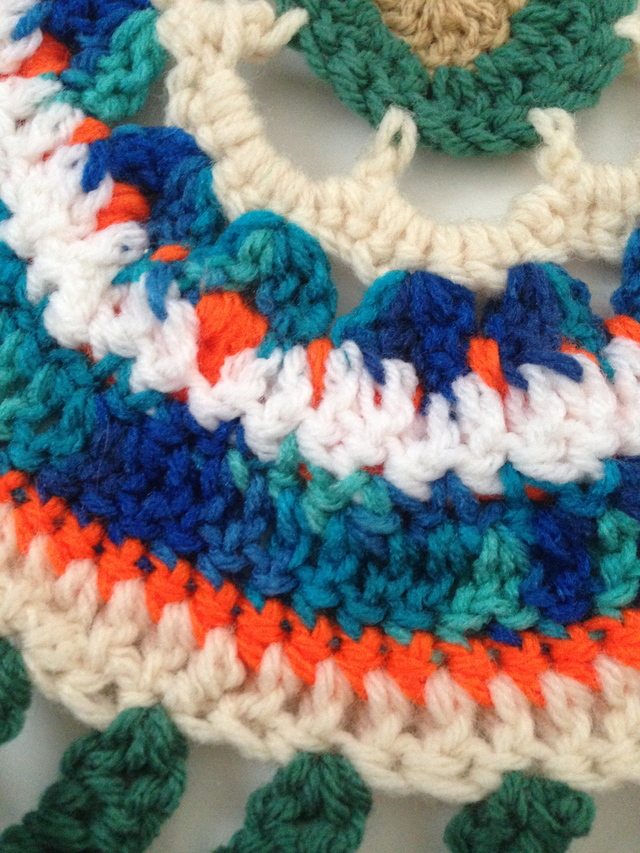
Marinke was open about her struggle with depression but she never sounded sorry for herself. She embraced a life of creativity and all of the small joy that it could bring her. On June 17, 2011, she wrote:
“I’ve been a real busy bee lately! I have so many projects on my needle and in my head, that I can barely find the time to photograph everything I finish! (but that really is a luxury problem, don’t you think?)”
The world received so many great creative items from Wink’s busy mind.
Genetics of Depression
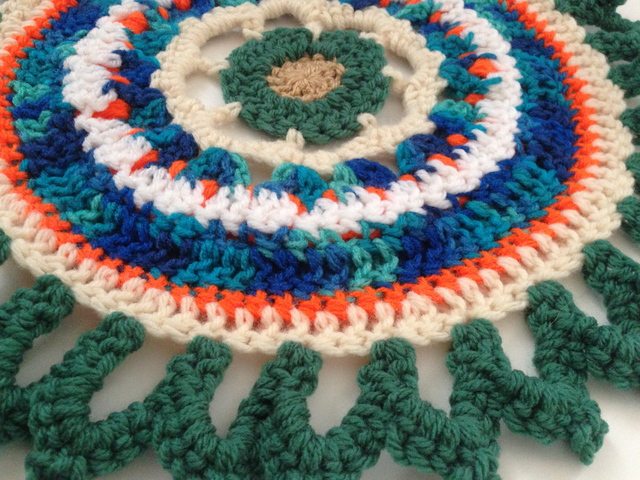
Today I want to talk about the causes of depression, of which there are many and sometimes the cause can be unknown. A Random Facts article with 60 facts about depression cites,
“The main risk factors of depression include past abuse (physical, sexual, emotional), certain medications (including drugs that treat high blood pressure), conflict with family members or friends, death or loss, chronic or major illness, and a family history of depression.”
That last one is an important one to note. A Healthgrades article by Christopher Iliades, MD says,
“Experts believe that about 50% of depression stems from genetics. This probably doesn’t come from just one gene but a combination. But, if you have a parent or sibling with depression, your risk is two to three times greater than it is for someone without this family history. The more severe the depression, the more likely the link to genetics.”
If you have any of the risk factors of depression, including genetics of depression, be aware that it’s important to:
- engage in good self-care
- look out for signs of depression in yourself
- get support from your loved ones
- talk about what is going on with you
- seek professional help as needed
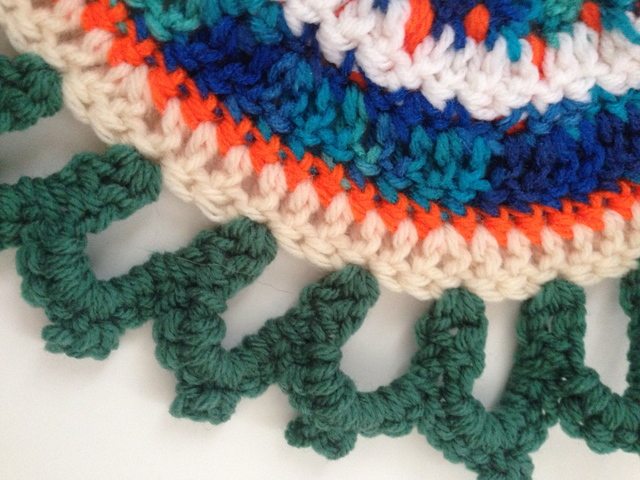
All contributions to Mandalas for Marinke raised awareness about depression while honoring Wink’s work in the same way that this great contribution has done today. See the first, second, and third posts that came before this one in the series.
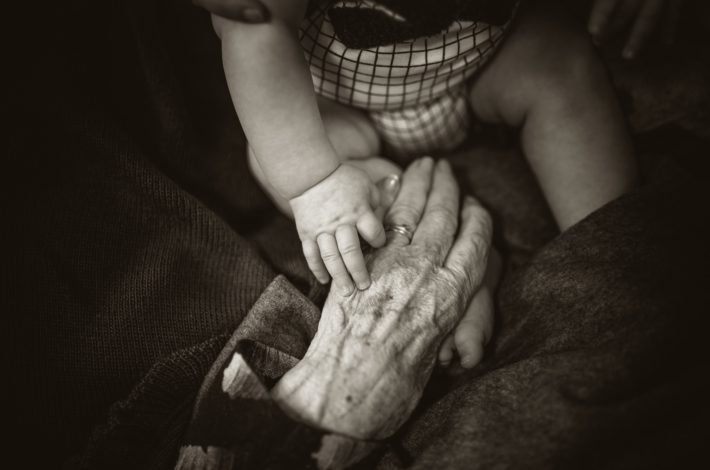
incredible about the blood pressure medications. Now i understand why I hate my 50’s
Once I had a horrible reaction to a blood pressure medication where I found myself despairing ‘at the bottom of a very deep black hole’. This is not my usual constitution so it was surprising and confusing. The answer: stop the medication! Within a day the sun had come out again. It scares me to think about this experience, to think that something as simple as only 1 medication could drive a person to that place. The problem with depression is that it can affect one’s thinking which makes it difficult to ‘join the dots’ to relate the cause and effect. Whenever I hear of a tragedy such as Wink’s I always wonder in the back of my mind whether it could have been avoided by reviewing medications.
I am also aware that the oral contraceptive pill can cause depression as a side effect and I often wonder about how much the uptake of the OCP in society may have contributed to the increasing rates of depression. Have there been any studies about that?
I would like to see better education of young women about the risk of depression with the OCP as well as ways of identifying depression in oneself or others. When I was a high school student, the OCP was presented as the most effective means of contraception but there was never any discussion of the risks apart from the risk percentage of getting pregnant! I found that other methods such as the Billings method were highly effective at helping me plan my family without exposing myself to the hormonal/chemical/health risks of the OCP.
Thank you for your awareness-raising project which is another positive legacy of Wink’s work.
Take care, xx
Thank you for sharing that important information. As I’m compiling the information for the depression awareness component of the project, I’ll do more research into medication stuff. I actually just realized in the last few days (thanks to a good friend of mine) that I’m likely anemic (again, I’ve had it in the past) and that’s probably contributing to my feelings of depression. So, so many factors to consider in health and wellness!!!
Jodi i been thinking of that too….about my own meds now…this scared me how one med can do it to a person…..
And people can be mean too pushing our buttons and it can trigger us….
Winks was sooo creative….it really sadden me a lot…
Kathryn here has been so very good…I hope this brings a lot of awareness…it needs it…
God bless you…my name is fran by the way….I’m from New Jersey….
<3